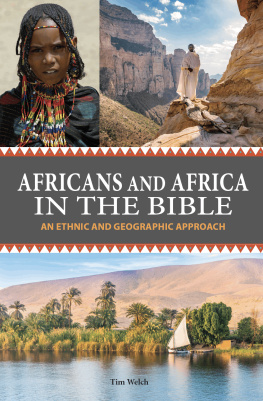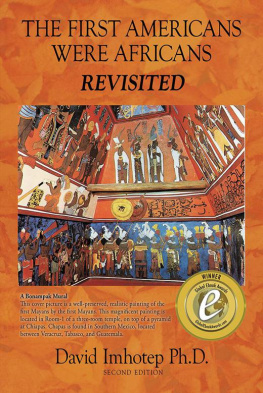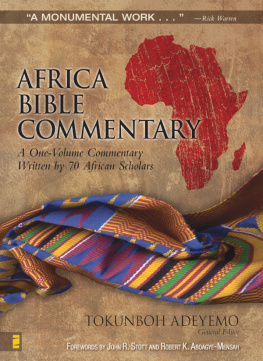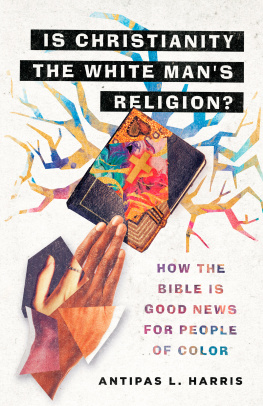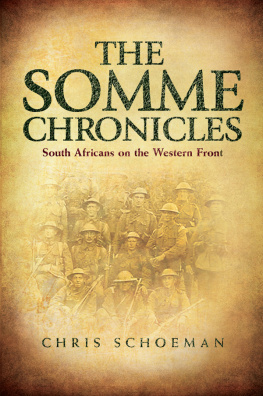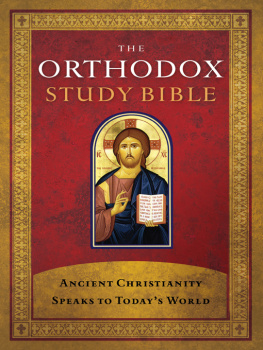This book is dedicated to my African friends who have shown by their love for the Lord, as well as by their family life, that they are an integral part of the gospel message:
FOREWORD
Why a book on Africa and the Bible? Surely the Bible in the Old Testament is about the land of Israel, the Philistines, Phoenicians, and the great empires of Mesopotamia and beyondAssyria, Babylonia, and Persia? Does not the New Testament focus on Palestine, Asia Minor, Greece, and Rome? Is Africa even in the Bibles scope of interest?
In Africans and Africa in the Bible , Tim Welch answers that last question with a resounding Yes! The entire canon, but especially the Old Testament, has an amazingly large number of references to the African continent and to Africans. In fact, I would hazard a guess that the reader will be astonished at the amount of people and places that are mentioned and that play an important role in the biblical story.
This book is important for at least two reasons. To begin with, the author is committed to demonstrating that the Bible and the Christian faith are not the white mans scripture and religion. As this work makes abundantly clear, Africa, particularly north and north-east Africa (present day Egypt, Libya, and Sudan), is central to many of the Bibles narratives. Africans and Africa in the Bible , in other words, is missiologically significant .
In addition, this work is educationally helpful . It offers a treasure chest of information about Africans who intersect Old Testament accounts and appear at key moments in the New Testament. For the Old Testament, Welch deals with, among others: Mosess Cushite wife, Phinehas, the multiple Pharaohs, Ebed-Melech who came to Jeremiahs aid, and Zephaniahs father Cushi. For the New Testament, he cites, for example, the Egyptians and Libyans present at Pentecost, the Ethiopian eunuch baptized by Philip in Acts 8, and Simeon called Niger who was a leader in the church at Antioch (Acts 13:1).
This informational feast is not just about people but also about places. Welch explains, for instance, why Egypt and Libya must be included in discussions about things African in the Bible, even as some would deny or minimize their African identity. He clarifies how Cush is better understood as being located in the area of modern Sudan, not Ethiopia. The African cities of Alexandria and Memphis and places like Goshen and Put are identified and their impact revealed. What is more, this volume closes with five appendices! The first lists in canonical order all the references to Africans and Africa in the Bible, the second is a concordance of verses mentioning Africans, whereas the third lists African place names. The fourth appendix registers some names that are disputed, and the fifth compares how African people and places in the Bible are translated in four English versions.
In recent years Africa has begun to take a higher profile in worldwide evangelical academic circles, although some of the topics of study differ from that of this book. One could mention theologian Thomas C. Odens investigation of Africas impact on Christianity ( How Africa Shaped the Christian Mind and The African Memory of Mark : Reassessing Early Church Tradition ) and Jehu Hanciless contribution to diaspora missiology ( Beyond Christendom : Globalization , African Migration , and the Transformation of the West ). Historian Philip Jenkins has done much to raise awareness of how the church is growing in the Global South, including Africa ( The Next Christendom : The Coming of Global Christianity and The New Faces of Christianity : Believing the Bible in the Global South ).
In terms of publications on Africa and the Bible, two come to mind when talking about non-African authors: J. Daniel Hayss From Every People and Nation : A Biblical Theology of Race and Edwin Yamauchis Africa and the Bible . From the pen of an African, perhaps Africa and the Africans in the Old Testament by the Nigerian David Tuesday Adamo is best known. Tim Welch is well-placed to add the fruit of his own research to this field. The material presented here in Africans and Africa in the Bible appeared initially in a slimmer volume in French; that material is now much expanded. Though not an African, he has served for many years in Cte dIvoire, working hard to facilitate projects at local, national, and continent levels that yield a truly contextualized African flavour to the study of the Bible.
This volume is careful, thorough, and irenic in tone. It deserves to be considered as a valuable resource alongside of the works by Hays, Yamauchi, and Adamo. As one of Tims former professors at Denver Seminary, it gives me great joy to heartedly commend Africans and Africa in the Bible to the reader. There is much to learn in its pages!
M. Daniel Carroll R. (Rodas), PhD
Blanchard Professor of Old Testament
Wheaton College and Graduate School
U.S.A.
PREFACE
I am the first one to admit that it would have been preferable to have an African write a book on Africans and Africa in the Bible. I have written such a text not because I think that I know more about this subject than my African brothers and sisters. Rather, it is because I find the subject matter both interesting and quite overlooked. I began research on this topic while studying at Denver Seminary (USA) for a course on the Old Testament in 1998. After finishing a short paper on Africans in the Old Testament, and following my return to Africa, I showed the paper to the director of the Centre de Publications Evangliques . He encouraged me to do more research on the matter and then present it as a manuscript for publishing. Fortunately, he is a patient man; it took me over three years to fulfil his request. The printing in Hong Kong also took time. L Afrique et les Africains dans la Bible finally appeared on bookshelves in Africa in early 2003.

